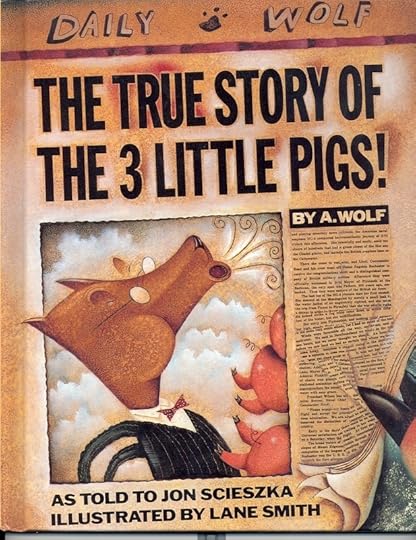The Unreliable Narrator in the Picture Book Format
 I was listening to one of my favorite podcasts, Pop Culture Happy Hour where employees of NPR dissect some aspect of pop culture in a smart and funny way each week. The show works for me because as I age I become worse and worse at knowing what is out there and this show allows me to keep my finger on the pulse of youth with the additional benefit of a thick veneer of class. A recent podcast spent half its time dissecting the Mad Men debut and the other half discussing the idea of the unreliable narrator in film, books, and music.
I was listening to one of my favorite podcasts, Pop Culture Happy Hour where employees of NPR dissect some aspect of pop culture in a smart and funny way each week. The show works for me because as I age I become worse and worse at knowing what is out there and this show allows me to keep my finger on the pulse of youth with the additional benefit of a thick veneer of class. A recent podcast spent half its time dissecting the Mad Men debut and the other half discussing the idea of the unreliable narrator in film, books, and music.
Listening to the talk, it sounds as if the unreliable narrator breaks down into at least three different types: The narrator that purposefully leads you astray, the narrator whose view of the world is so strident that by sheer force of will they are attempting to lead you astray, and the narrator who does not attempt to lead you astray but does by dint of their youth and inexperience. And though they cited mostly The Catcher in the Rye and Room as examples of that last type, I found myself drifting into thinking about how this applies to the picture books of the past and the present.
This isn’t just idle speculation. With the rise of the Core Curriculum kids are beginning to learn more about opposing viewpoints and alternative perspective. They’re walking into libraries asking for first person narratives in picture book formats. Which means, it might not be long before savvy teachers start to provide elementary school insights into what is a remarkably advanced concept.
On the aforementioned podcast, Glen Weldon says the following: “It [the unreliable narrator] puts you in the head of somebody else… it exaggerates your faults. Where YOU think the world is this way and you’re willing to kind of assert it until the dam busts. And it’s a way to teach a moral lesson without doing it in a very heavy-handed way . . . It’s the ultimate post-modern thing where this thing we’ve trusted for centuries, the narrative voice, is now called into question.”
This caught my ear since picture books are, in some cases, meant to be repositories of moral lessons. And if a person can give a moral lesson without didacticism they are seen as doing a very good job. I am starting to write picture books myself. Now imagine being able to write for kids and impart ideas without sounding preachy. It can be done! Examples?
The True Story of the Three Little Pigs by Jon Scieszka, illustrated by Lane Smith – If you Google the term “unreliable narrator” and “picture books” this is pretty much the only thing that comes up. Probably because it’s the best of the genre. If Scieszka is remembered for nothing else it will be for applying sophisticated ideas to picture books, ending with products that both inform and amuse kids and adults (keep a VERY sharp eye out for his Battle Bunny this fall, co-written with Mac Barnett, and a game changer in a different way altogether). Of course no brilliant idea comes without a price. This book started the trend of villains telling their sides of their tales in picture books. It’s an idea we’re still suffering through, to a certain extent.
I Want My Hat Back by Jon Klassen – Interesting because it’s actually a shift. The narrator begins as reliable and then becomes unreliable by the end of the book. Is this a tale about the hero’s journey? Or is it actually the hero’s fall? All I care is that the bunny had it coming.
This is Not My Hat by Jon Klassen - I didn’t mean to cite the most recent Caldecott Award winner but the Horn Book referred to this as a book featuring an unreliable narrator. I would argue that it’s not so much that he’s unreliable as much as he’s just wrong.
Olivia Saves the Circus – If Scieszka’s wolf is the kind of narrator trying to lead you astray then Olivia is a force of will, attempting to make you believe precisely what she too wants to believe. She tests the tensile strands of precocious tolerance and gets away with it. Probably because the text is so good on this one. My favorite Olivia book, bar none.
Dear Mrs. LaRue: Letters From Obedience School – Author Mindy Hardwick came up with this one (read her post for suggestions on writing an unreliable narrator if you’re interested in making your own). This book has the dual advantage of not only being unreliable but an epistolary picture book as well. Kids ask for such things already.
Mention the others if you can! I wouldn’t mind putting together a list of as many as folks can conceive of. It would be interesting to note the years they started becoming more common.




